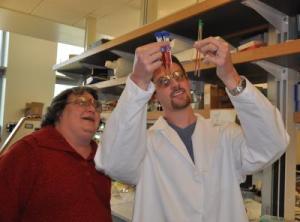You pick up a bottle of pomegranate juice at the store because you've learned that, although it costs more than most juices, it is replete with antioxidants that bring health benefits.
But wait: Is the juice you've purchased really pomegranate juice? Or is the product label you have carefully read promising more than it delivers?
 Cynthia Larive (left) and her graduate student Daniel Orr examine pomegranate juice samples in the laboratory.
Cynthia Larive (left) and her graduate student Daniel Orr examine pomegranate juice samples in the laboratory.
A chemist at the University of California, Riverside is determined to find out. Cynthia Larive, a professor of chemistry, is playing detective by applying chemical tests to juice products sold as pomegranate juice or pomegranate juice blends, in order to authenticate their contents.
"We are measuring levels of unique compounds in pomegranate juice and are able to use this 'molecular fingerprint' to discriminate against adulterated juice products," said Larive, whose research on pomegranate juice is being funded by a nearly $50,000 one-year grant from Pom Wonderful, a company that grows and markets pomegranates and pomegranate-based products.
In the lab, Larive and her graduate student Daniel Orr are measuring levels of different biochemicals, called small-molecule metabolites, present in juices. To make their measurements, the researchers are using nuclear magnetic resonance spectroscopy, liquid chromatography-mass spectroscopy, and gas chromatography-mass spectroscopy – three methods that together allow them to measure amino acids, organic acids, sugars, pomegranate pigment compounds, as well as health-producing antioxidant molecules that are unique to pomegranate juice.
"We have received a collection of pomegranate samples from around the world, as well as commercial juices such as beet, grape, apple and pear – to name just a few," Larive said. "We're looking at whether or not our molecular fingerprint method can be used to identify products claiming to contain pomegranate juice when they don't, and products claiming to be pomegranate juice when they are not."
According to Larive, the three methods her lab used on pomegranate juices can be used to authenticate other products such as wine and olive oil by checking whether their metabolite profiles match what the products are claimed by their manufacturers to be.
"We are really curious to see how far we can push the technology," she said. "This research dovetails nicely with some of the research we're already doing at UC Riverside on hypoxia in plants with Julia Bailey-Serres. Where our experiments are concerned, juices, wine and olive oil are simply different sets of plant compounds. So it should be relatively easy to extrapolate the work we're doing on pomegranate juices to these products."
Larive explained that by examining the levels of different compounds in, say, pomegranate juice, a statistical picture – or chemical profile – emerges that describes the juice. Then, depending on how much an unknown product's profile differs from the pomegranate juice profile, her lab can determine whether that unknown product is pomegranate juice or contains only some or none of it.
Source: http://www.ucr.edu/